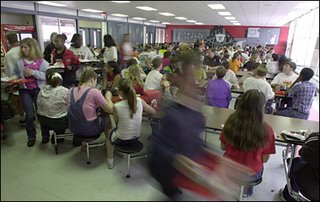 It's the beginning of the school year and I'm sure you think you did all you could to prepare your children for this eventuality. You got them new clothes, new school supplies, haircuts, and probably a new backpack or lunchbox. You drop them off and assume all will go well. Let's hope so.
It's the beginning of the school year and I'm sure you think you did all you could to prepare your children for this eventuality. You got them new clothes, new school supplies, haircuts, and probably a new backpack or lunchbox. You drop them off and assume all will go well. Let's hope so.As a parent you only know so much about what goes on in your child's school. Unless you take the time to ask some questions and get involved, you may not see the things you really should see.
For example, do you know if your child's school is overcrowded? If you do, do you know what that really feels like for kids and teachers? Do you know that just trying to feed children in overcrowded schools is a nightmare?
The days of kids going home for lunch is long gone in most communities around the country. Neighborhood schools don't exist like they used to. Kids are bused from all over the district to go to schools far from their homes. I watched as my son started high school and wondered how their small cafeteria could possibly house and feed 800 kids each lunch session (they have 3 sessions). The answer is that they can't.
Kids spill out of the cafeteria and into the muggy courtyard with the hot Florida sun beating down on them and fight for tables like when you play musical chairs. The rest eat their lunches on the ground in the outside hallways. This doesn't look comfortable or safe. But at the moment, this is the only solution.
Why can't my son just walk home for lunch? We live directly behind the school. This is a "closed" campus and kids can't just come and go, even if the parent gives permission. There are liability issues and it's easier for the school to keep an eye on kids if they remain on campus.
But not every district handles it this way. Every school determines what's the best way to handle their own problems, and as parents we can be a part of the problem or part of the solution. But there's a bigger chance we'll end up being part of the problem if we don't educate ourselves to what's really going on in our kids' schools.
So this year I recommend that you consider the following:
- Be visible - show up often enough that you are recognizable to the front office staff.
- Be available - teachers will call you when there's a problem if they know they can. Make it okay for them to call you at home or at work whenever is necessary.
- Be assertive - ask questions, initiate first contact with teachers, introduce yourself to the principal whenver you see him or her
- Be involved - ask your child specific questions and you'll get specific answers. If you only ask, "What did you do in school today?" you'll get the traditional answer, "Nothing." Ask instead, "Are you still doing review in math right now or have you started Algebra now?"
If we don't know what's going on in our child's school, we can't be what our kids need when they need us. So be proactive, show your face, and get involved.
